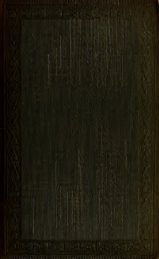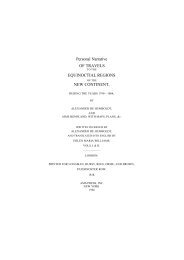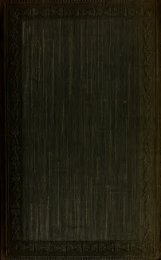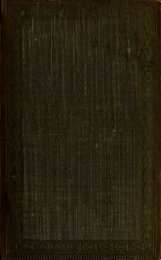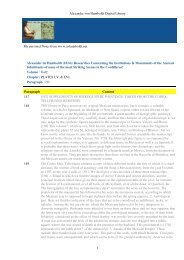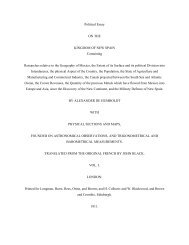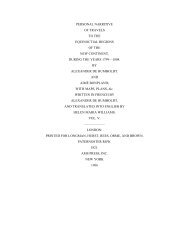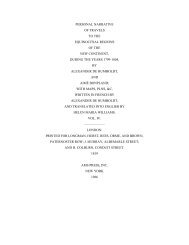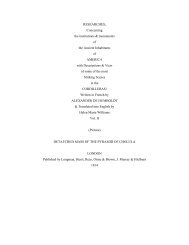See the complete document here
See the complete document here
See the complete document here
You also want an ePaper? Increase the reach of your titles
YUMPU automatically turns print PDFs into web optimized ePapers that Google loves.
THE ARABS.<br />
'<br />
2l&<br />
ad<strong>here</strong>nts of Islamisrn toward anatoraica] investigations impeded<br />
<strong>the</strong>ir advance in zoology. They remained contented<br />
with that which <strong>the</strong>y were able to appropriate to <strong>the</strong>rnselvey<br />
irom translations of <strong>the</strong> works of Aristotle and Galen ;* but,<br />
deaArahes, publ. par L. Am. Sediilot, t. i., 1834, p. 312-318; t. ii., 1835,<br />
preface, with Humboldt's Examen Crit. de V Hist, de la t. Geogr., iii.,<br />
p. 64, and Asie Cenirale, t. iii., p. 593-596, iu which <strong>the</strong> data occur<br />
whicla I derived from <strong>the</strong> Mappa Mtnidi of AlHacus of 1410, in <strong>the</strong><br />
"<br />
Alphonsine Tables,''^ 1483, and iu<br />
JNIadrignano's Itinerariuvi Portugallensium,<br />
1508. It is singular that Edrisi appears to know nothing of<br />
Kliobbet Arin (Cancadora, more properly Kankder). Sediilot <strong>the</strong><br />
yoimger (in <strong>the</strong> Mimoire surles Systemes Gdographiqucs dcs Grecs et des<br />
Arabes, 1842, p. 20-25) places <strong>the</strong> meridian of Arin in <strong>the</strong> group of <strong>the</strong><br />
Azores, while <strong>the</strong> learned commentator of Abulfeda, Reinaud {Memoire<br />
sur VInde anterieurement au Xle siecle de Vere Chrclicnne d'apres les<br />
icrivains Arabes ei Persans, p. 20-24), assumes that "<strong>the</strong> word Arin<br />
has originated by confusion from Azpi, Ozein, and Odjein, an old seat of<br />
cultivation (according to Biirnouf, Udjijayaui iu Malwa), <strong>the</strong> ^O^r/vrj of<br />
Ptolemy. This Ozene was supposed to be in <strong>the</strong> meridian of Lanka,<br />
and iu later times Arin was conjectured to be an island on <strong>the</strong> coast of<br />
Zanguebar. perhaps <strong>the</strong> Hggvvov of Ptolemy." Compare, also, Am.<br />
Sediilot, Mim. sur les Instr. Astron. des Arabes, 1841, p. 75.<br />
* The Calif Al^Mamuu caused many valuable Greek manuscripts to<br />
be purchased in Constantinople, Armenia, Syria, and Egypt, and to be<br />
translated direct from Greek into Arabic, iu consequence of <strong>the</strong> earlier<br />
Arabic versions having long been founded on Syrian translations (Jourdain,<br />
Recherches CHt. sur V Age et sur VOrigine des Traductions Latines<br />
d^Aristote, 1819, p. 85, 88, and 226). Much has thus been rescued by<br />
<strong>the</strong> exertions of Al-Mamun, which, without <strong>the</strong> Arabs, would have<br />
been wholly lost to us. A similar service has been rendered by Armenian<br />
translations, as Neumann of Munich was <strong>the</strong> first to show. Unhappily,<br />
a notice by <strong>the</strong> historian Guezi of Bagdad, which has been<br />
preserved by <strong>the</strong> celebrated geographer Leo Africanus, in a memoir<br />
entitled De Viris inter Arabes illustribus, leads to <strong>the</strong> conjecture that<br />
at Bagdad itself many Greek originals, which were believed to be use^<br />
less, were burned ; but this passage may not, perhaps, refer to important<br />
manuscripts already translated. It is capable of several interpre<br />
tations, as has been shown by Bernhardy {Grundriss der Griech. Litteratnr,<br />
th. i., s. 489), in opposition to Heeren's Geschichte der Classischen<br />
Litteratur, bd. i., s. 135. The Arabic translations of Aristotle have<br />
often been found serviceable in executing Latin versions of <strong>the</strong> original,<br />
as, for instance, <strong>the</strong> eight books of Physics, and <strong>the</strong> History of Animals ;<br />
but <strong>the</strong> larger and better part of <strong>the</strong> Latin translations have been made<br />
direct from <strong>the</strong> Greek (Jourdain, Reck. Crit. sur VAge des Traductions<br />
d^Aristote, p. 230-236). An allusion to <strong>the</strong> same two-fold source may<br />
be recognized in <strong>the</strong> memorable letter of <strong>the</strong> Emperor Frederic H. of<br />
Hohenstaufen, in w-hich he recommends <strong>the</strong> translations of Aristotle<br />
which he presents, in 1232, to his universities, and especially to that of<br />
Bologna. This letter expresses noble sentiments, and shows that it<br />
was not only <strong>the</strong> love of natural history which taught Frederic IL to<br />
appreciate <strong>the</strong> philosophical value of <strong>the</strong> " Compilationes varias qu;e<br />
ab Aristotele aliisque philosophis sub GnBcis Arabicisque vocabulis an<br />
tiquitus edita.' sunt." He writes as follows : " We have from onr earlies'



